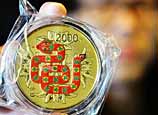
The swap line was top of London bankers' wish lists but hopes the central bank would grant it had not been high.
"It was a bit of a bolt from the blue," said Andrew Malcolm, head of capital markets for Asia at law firm Linklaters, describing the decision as "an opportunity for London to establish itself as the pre-eminent renminbi center in Europe."
Despite the US appetite for Chinese goods, it is Britain that handles the world's biggest share of yuan payments outside China, according to SWIFT, at 28 percent compared with 4 percent handled in the US.
London is the world's biggest foreign exchange and bond trading center and Britain is hoping for an offshore yuan bond market to replicate the explosion in such business in Hong Kong, Asia's main offshore yuan center.
There have only been a handful of yuan bonds launched in London, but issuance of offshore yuan, or "dim sum", bonds in Hong Kong may rise this year by 20 to 30 percent, to as much as 350 billion yuan (US$56 billion) including certificates of deposit, according to Standard Chartered estimates.
Daily offshore yuan trading in London surged 150 percent in the year to June 2012, to US$1.7 billion, according to a recent survey by Bourse Consult for the City of London.
However, yuan deposits, recorded as totalling 109 billion yuan at end-2011, suffered from a depreciation of the yuan in early 2012, and had also been overstated due to misreporting by some banks. The interbank and corporate deposit total collated by Bourse Consult shrank to 15 billion yuan in June 2012.
Bankers may now look further down their wish lists and seek a British sovereign yuan bond.
To spur the market further, Britain could launch a yuan bond in China, China could issue an offshore yuan bond in London, or London could settle trades directly, rather than through Hong Kong.
Other Chinese borrowers could also launch more yuan bonds in London, following a sole Chinese issue last year.

















 A 9-year-old son takes good care of his amputee mother:"adults have a priority over delicious meals"
A 9-year-old son takes good care of his amputee mother:"adults have a priority over delicious meals"


![]()
